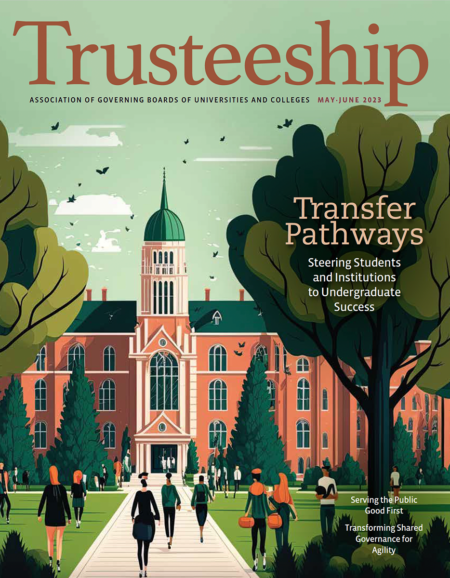
Last fall, I argued in Trusteeship that American democracy and the country’s role as a world leader are in jeopardy (www.AGB.org/Democracy). I am especially concerned that having an educated citizenry, one of the biggest advantages that the United States has had on the world stage since the 1950s, is being eroded even though having an educated citizenry is more vital than ever before. Weaknesses in our national higher education model will corrode our democracy, our economy, and our society.
The Challenges Before Us
- Countries around the world are heavily investing in postsecondary education, with more students remaining in their home countries or going to another part of the world to get an education.
- There is increasing skepticism and concern from lawmakers and the public about whether student outcomes warrant the price of higher education.
- We are not producing enough students qualified to fill jobs in a number of critical areas, such as STEM.
- Far too many of our colleges and universities admit students who do not earn their degrees, often incurring debt that they aren’t able to repay.
In my article, I called on governing boards to provide strategic leadership to overcome the challenges before us, in collaboration with their chief executive officers, administrators, and faculty.
A National Strategic Response
Based on the positive reception I received, I began speaking with leaders from higher education, business, and the government about potential solutions. These conversations supported the notion that the United States needs a more unified strategy to address some of the most pressing outcome-related issues in higher education identified above. We need to determine how to strengthen our global leadership position, grow the talent needed to fuel our economy, address gaps across student groups and between the academy and industry, and achieve internationally competitive levels of learning for our students compared to their global peers.
Although these are certainly not the only challenges facing higher education, these are the primary obstacles that will impede the United States and weaken our place in the world. Moreover, these challenges will only expand in scope as the global, digital, knowledge economy continues to transform the world at a blindingly fast pace.
The Council on Higher Education as a Strategic Asset
Given the stakes, I am pleased to announce a collective effort to close the knowledge gap between American talent and that of the rest of the world. Specifically, several national leaders from many sectors have joined together to form the Council on Higher Education as a Strategic Asset (HESA) with the goal of uniting business, government, higher education, and military leaders in developing an urgent national higher education strategy to raise the global competitive position of the United States. The council will develop high-impact recommendations to leverage the strengths of our higher education institutions to drive global competitiveness, keep our nation secure, sustain our democracy, and propel economic and social prosperity.
We believe that these public policy recommendations will build a national agenda that demonstrates to not only government leaders—including the president of the United States, Congress, state governors, and other lawmakers—but also to higher education boards and chief executive officers, the need for targeted support to effectively position higher education as a strategic asset and coordinate a community of institutions committed to collectively advancing the national interest. Leveraging data and insights from affiliated organizations and subject matter experts, the council will identify priority areas of action and publish working papers, presentations, and a cumulative report with recommendations that will go to lawmakers.
The council is currently composed of 38 commissioners, augmented by a cadre of strategic advisors, and backed by many affiliated organizations and associations. As cochairs of the council, the leadership of Michael Crow, PhD, the president of Arizona State University, and Robert L. King, JD, the former assistant secretary for postsecondary education in the U.S. Department of Education, will be instrumental in ensuring we make the kind of impact that will change the trajectory of the national discourse.
I will share more with you in the coming months as this important work advances. I welcome your thoughts, suggestions, and ideas. Find out more about the council at www.HESAUS.org.
Henry Stoever
AGB President and Chief Executive Officer
RELATED RESOURCES
![]()
Trusteeship Magazine Article
American Democracy Is in Jeopardy:
A Call to Higher Education Governing Boards


